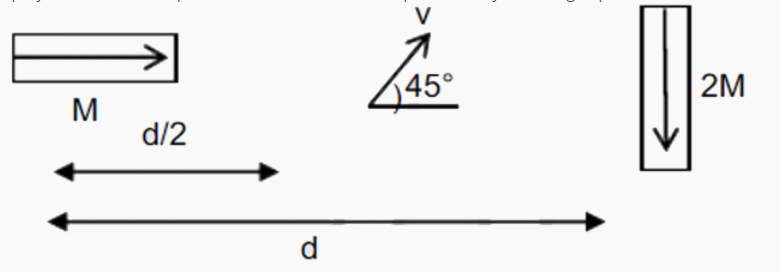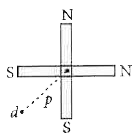Two magnets and are identical and these are arranged as shown in the figure. Their length is negligible in comparison to the separation between them. A magnetic needle is placed between the magnets at point P which gets deflected through an angle under the influence of magnets. The ratio of distance and will be

Step by step video & image solution for Two magnets A and B are identical and these are arranged as shown in the figure. Their length is negligible in comparison to the separation between them. A magnetic needle is placed between the magnets at point P which gets deflected through an angle theta under the influence of magnets. The ratio of distance d_(1) and d_(2) will be by Physics experts to help you in doubts & scoring excellent marks in Class 12 exams.
Updated on:21/07/2023Topper's Solved these Questions
Similar Questions
A thin bar magnet of length 2L is bent at the mid point, so that the angle between them is 60∘.Find the new length of the magnet.
View SolutionA bar magnet of length 2 l and magnetic moment m is suspended freely in a uniform magnet field B. Find the amount of work done to deflect the magnet through an angle θ from the direction of the field.
View Solution
Knowledge Check
A wire is placed between the poles of two fixed bar magnets as shown in the figure. A small current in the wire is into the plane of the paper. The direction of the magnetic force on the wire is
 A↑B↓C→D←
A↑B↓C→D←Two long wires are placed parallel to each other 10cm apart as shown in figure. The magnetic field at point P is
 A5/6×10−3T directed perpendicular into the paperB1/3×10−3T directed perpendicular out of the paperC5/6×10−3T directed perpendicular out of the paperD1/6×10−3T directed perpendicular into the paper
A5/6×10−3T directed perpendicular into the paperB1/3×10−3T directed perpendicular out of the paperC5/6×10−3T directed perpendicular out of the paperD1/6×10−3T directed perpendicular into the paperA thin bar magnet of length 2L is bent at the mid point, so that the angle between them is 60∘.Find the new length of the magnet.
A√2LB√3LC2LDL
Two short magnet A and B of magnetic dipole mement M1 and M2 respectively are placed as shown.The axis of A and the equatorial line of B are the same.Find the magnetic force on one magnet due to other.

View SolutionIn the figure shown below if 'D' isa diamanetic substance placed between two strong magnetic poles, map the magnetic lines of force.

View SolutionIn the figure shown below if 'D' isa diamanetic substance placed between two strong magnetic poles, map the magnetic lines of force.

View SolutionTwo magnetic dipoles are lying as shown in figure. The separation 'd' between them is very large. A point charge Q is projected with some speed v as shown. The force experienced by the charged particle is :

View SolutionTwo short magnets of equal dipole moments M are fastened perpendicularly at their centres as shown in the figure. The magnitude of the magnetic field at a distance d from the centre on the bisector of the right angle is

View Solution

